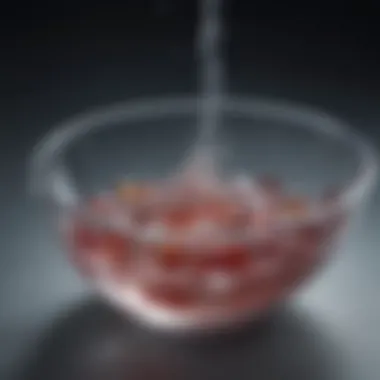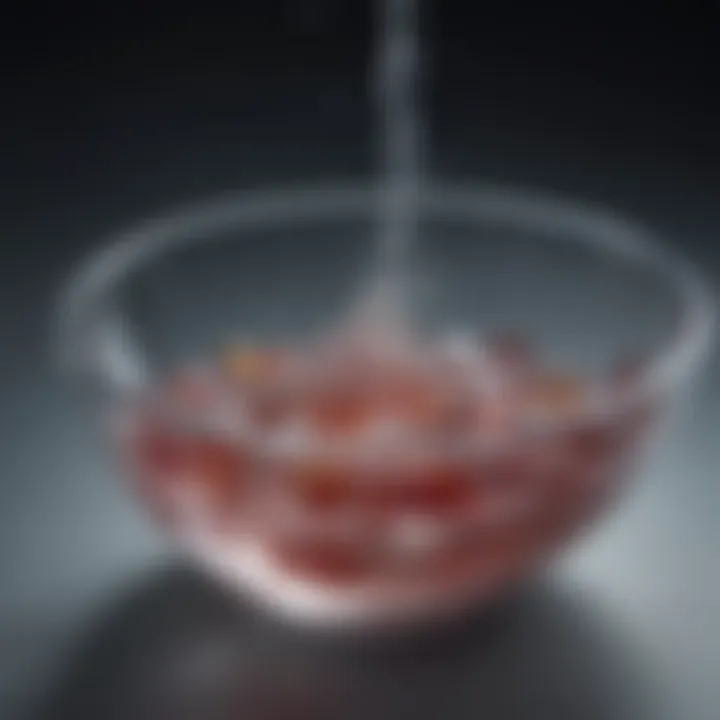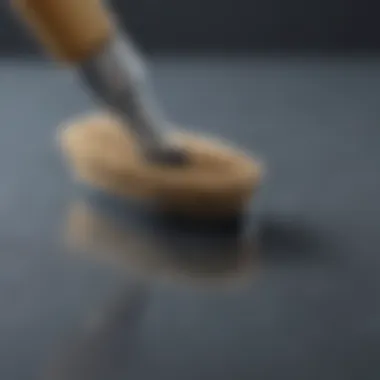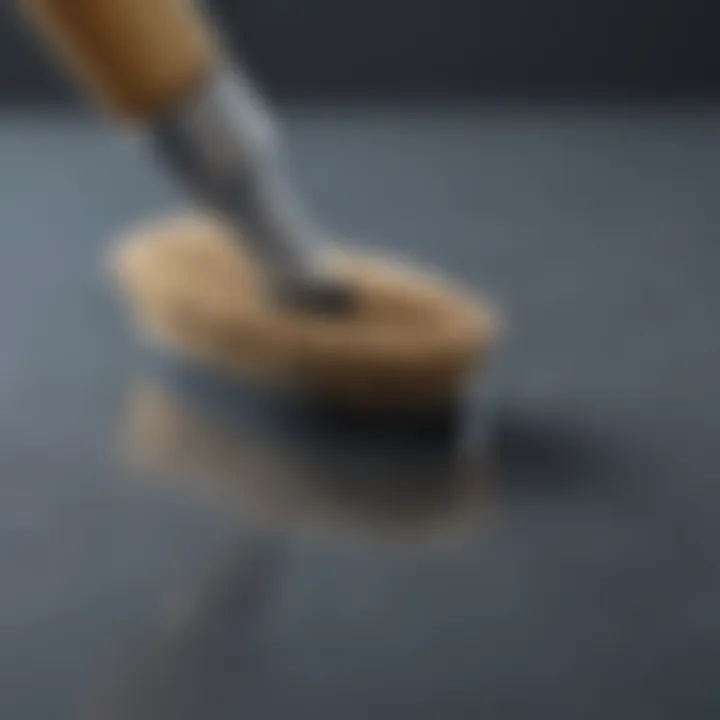Using Dawn Dish Soap to Clean Jewelry: An In-depth Guide


Intro
Jewelry is often more than just an accessory; it holds sentimental value and represents personal style. Regular cleaning is key to maintaining its beauty and integrity. Dawn dish soap has gained popularity as a practical option for cleaning various types of jewelry. In this article, we will explore the effectiveness and safety of this method, providing detailed instructions and insights into the best practices for jewelery care.
Understanding the Appeal of Dawn Dish Soap
Dawn dish soap is known for its ability to cut through grease and grime. But its benefits extend beyond kitchen cleaning. Many jewelery owners have discovered that using diluted Dawn can impart a new life to their beloved pieces. It is a cost-effective solution that does not require specialized cleaning products.
Safety First
Before embarking on a cleaning journey with Dawn, it’s crucial to understand which types of jewelry can safely withstand this method. Generally, items such as gold, platinum, diamonds, and non-porous gemstones fare well with mild dish soap. However, porous stones like opals and pearls require more caution, as they can absorb moisture and damage over time. Always consider the material composition of your jewelry before proceeding.
Materials Required
To clean jewelry effectively with Dawn dish soap, gather the following materials:
- Dawn dish soap: Opt for a mild variant to ensure gentleness.
- Warm water: Avoid hot water, which could damage certain jewelry types.
- A soft brush or cloth: This will help remove dirt without scratching.
- Bowl: Use a small bowl for mixing solution.
- Soft towel: For drying off the cleaned pieces.
Steps for Cleaning Jewelry with Dawn
- Mix the Solution: In the bowl, combine lukewarm water with a few drops of Dawn dish soap. A good measure is a ratio of one part soap to three parts water.
- Soak the Jewelry: Submerge your jewelry in the solution. Allow it to soak for about 5 to 10 minutes.
- Gently Scrub: Using the soft brush or cloth, gently scrub the jewelry. Focus on intricate areas where dirt is more likely to accumulate.
- Rinse Thoroughly: Rinse the pieces under lukewarm water to remove all soap residue. Ensure all areas are rinsed to avoid any buildup.
- Dry Carefully: Place the cleaned jewelry on a soft towel. Pat dry gently to avoid scratches.
Evaluating the Pros and Cons
While cleaning your jewelry with Dawn presents several advantages, it also comes with some drawbacks.
Advantages
- Cost-Effective: Dawn is inexpensive and easily accessible.
- Efficient: It effectively removes grime, restoring shine.
Disadvantages
- Material Limitation: Some stones and materials may not withstand the method.
- Not for All Jewelry: Items with specific finishes could be affected negatively.
"Using Dawn dish soap can be a highly effective method for maintaining your jewelry's appearance when done correctly."
Ending
In summary, cleaning jewelry with Dawn dish soap can be a beneficial and effective practice if approached carefully. Knowing the characteristics of your jewelry and following the proper cleaning procedures will help in maintaining its shine and clarity. With this in mind, you can integrate Dawn into your jewelry care routine and enjoy your prized pieces for years to come.
Preface to Jewelry Care
Caring for jewelry is not just about aesthetics; it is also about preservation. Jewelry can hold significant emotional and financial value, making proper maintenance essential. Routine cleaning ensures that pieces remain vibrant and do not succumb to wear over time. Regular care helps to avoid irreversible damage, such as oxidation or tarnishing, which can detract from the beauty of a piece.
In addition to maintaining appearances, proper jewelry care also addresses hygiene concerns. Jewelry can accumulate body oils, dirt, and other contaminants, which can lead to skin irritations or infections. Therefore, understanding how to clean jewelry effectively is vital, and that is where the simple method of using Dawn dish soap comes into play.
By using a common household item, individuals can ensure their jewelry remains in excellent condition without needing expensive professional treatments. This guide aims to empower readers with the knowledge of different cleaning practices, specifically outlining the benefits of using Dawn dish soap for jewelry care, thereby enhancing their jewelry maintenance routine.
Importance of Jewelry Maintenance
Maintaining jewelry is crucial for multiple reasons. Firstly, it helps to retain the original shine and beauty of the pieces. Over time, exposure to air, moisture, and skin can lead to dirt buildup, dulling the jewelry's finish. Regular cleaning removes this buildup, restoring the piece's vibrant appearance.
Secondly, consistent maintenance prevents potential damage. For instance, gemstones and metals can become discolored or weakened if not properly cared for. This is particularly important for sentimental pieces that may have been handed down through generations, as any damage can diminish both their aesthetic value and sentimental worth.


Lastly, wearing clean jewelry is much more hygienic. Even simple items like rings can harbor bacteria if not properly cleaned. Regular cleaning and maintenance address these concerns, ensuring that your jewelry is not only beautiful but also safe to wear.
Common Jewelry Cleaning Methods
When it comes to cleaning jewelry, several methods exist, each with its respective pros and cons. Common methods include:
- Ultrasonic Cleaning: This method uses ultrasonic waves to clean jewelry deeply. While effective, it may not be safe for all materials, particularly porous stones.
- Commercial Jewelry Cleaners: These products are designed specifically for jewelry care. However, they can contain harsh chemicals that may not be suitable for all types of jewelry.
- Natural Cleaners: Mixtures like vinegar and baking soda can be good alternatives, but they may not be as effective on more delicate pieces.
Using Dawn dish soap provides a practical and safe option. It is gentle yet effective, making it suitable for a wide range of jewelry types. With a careful approach, users can achieve excellent results with minimal risk, combining simplicity and efficiency seamlessly.
Dawn Dish Soap: An Overview
Understanding the role of Dawn dish soap in jewelry cleaning is essential for those seeking practical methods to maintain their accessories. This section sheds light on this popular cleaning agent, outlining what it is and why it has become a favored tool in domestic jewelry care.
What is Dawn Dish Soap?
Dawn dish soap is a liquid detergent known for its effective grease-cutting properties. Developed by Procter & Gamble, it is primarily designed for washing dishes but has garnered attention for its multi-purpose capabilities. The formula includes surfactants that lift dirt and grease while remaining gentle on delicate surfaces. Thus, it can offer a safe solution for cleaning various items, including silver, gold, and even costume jewelry.
Why Choose Dawn for Jewelry Cleaning?
Choosing Dawn dish soap for jewelry cleaning holds several benefits that stand out compared to other cleaners. First, its gentle composition is effective but not overly harsh, which minimizes the risk of damaging precious metals and delicate gems. Additionally, Dawn is readily available in most households, making it a convenient choice.
Moreover, using Dawn dish soap typically does not require complex procedures or specialized tools. The effectiveness of Dawn comes from its ability to emulsify dirt, making it easier for you to remove grime and buildup. Since it is a trusted brand with a longstanding presence in the market, many users report satisfaction with their results.
"Using Dawn dish soap provides a simple, affordable method to keep your jewelry looking its best."
In summary, the combination of its gentle yet powerful cleaning abilities, accessibility, and overall trustworthiness makes Dawn dish soap a valuable resource in jewelry care. For detail-oriented individuals, this justifies the inclusion of Dawn in their jewelry maintenance product arsenal.
Materials Required for Cleaning
Cleaning jewelry with Dawn dish soap can be an effective method. However, having the right materials is crucial to achieve the best results and ensure the safety of your pieces. Using improper tools or solutions might damage the jewelry, so understanding the specific requirements is essential.
Essential Cleaning Supplies
To successfully clean your jewelry, you will need certain supplies. Here are the essential items to have on hand:
- Dawn dish soap: This is the primary cleaning agent. It is gentle yet effective at cutting through grease and grime.
- Warm water: Mixing the soap with warm water helps to better dissolve dirt and oils.
- A small bowl: This is used to create the cleaning solution.
- Soft-bristle toothbrush: Ideal for gently scrubbing the jewelry without scratching or causing damage.
- Microfiber cloth: A soft cloth for drying your jewelry and buffing it to restore shine.
- A soft cloth or towel: For placing your jewelry after cleaning, ensuring it remains scratched-free.
Having these items ready before starting the cleaning process can save time and effort. It also makes the task of cleaning jewelry feel much more efficient.
Safety Equipment
While the materials for cleaning jewelry with Dawn dish soap are quite straightforward, safety should not be overlooked. Certain precautions must be taken to protect both yourself and your jewelry:
- Gloves: Wearing rubber or latex gloves can protect your hands from irritation caused by soap or other residues in cleaning supplies.
- Protective eyewear: Although rare, splashes can occur when mixing cleaning solutions, so it helps to safeguard your eyes.
- Adequate workspace: Ensure your cleaning area is well-lit and organized. This minimizes the chances of accidents involving valuable pieces, especially when maneuvering delicate items.
"Preparation is key when it comes to effectively cleaning jewelry. Have all materials ready to ensure a smooth process."
By gathering the necessary materials and safety equipment, you can proceed confidently with the cleaning process. This preparation will help maintain the integrity of your jewelry while ensuring a hassle-free experience.
Step-by-Step Guide to Cleaning Jewelry with Dawn Dish Soap
A precise, methodical approach to cleaning jewelry with Dawn dish soap ensures optimal results while safeguarding your pieces. This segment is essential as it clarifies the steps involved in the cleaning process, offering both clarity and confidence to users. By understanding each step, one can appreciate the practical benefits of using a household item in jewelry care. This guide focuses on accessibility, allowing individuals at any skill level to effectively clean their jewelry while maintaining its integrity.
Preparing the Cleaning Solution


Begin by gathering the necessary materials: Dawn dish soap, warm water, and a suitable container. A small bowl or dish is ideal. The mixture should consist of lukewarm water mixed with a few drops of Dawn dish soap. It is crucial that the soap is well-diluted to prevent any residue from sticking to the jewelry after cleaning. Typically, a ratio of one tablespoon of soap to about one cup of warm water works well. This solution acts to loosen grime and dirt without using harsh chemicals.
Soaking the Jewelry
Place your jewelry in the prepared solution, ensuring that each piece is fully submerged. Allowing the jewelry to soak for approximately 10-15 minutes will help break down built-up dirt and oils. This period may vary depending on the item’s level of tarnish or dirt; heavily soiled pieces might require extra time. However, remember that items with delicate settings or stones should not soak for too long as prolonged exposure could weaken the settings.
Scrubbing Techniques
After soaking, it’s time to gently scrub the jewelry. Use a soft-bristle toothbrush or a jewelry cleaning brush. The goal here is to focus on crevices and joints where dirt often accumulates. It’s important to apply light pressure to prevent damage or scratching to both the jewelry and the brush. For intricate designs, a cotton swab may aid in reaching tight spaces. Typically, a few minutes of scrubbing per item is sufficient.
Rinsing and Drying
Thoroughly rinse each piece under lukewarm running water. This step is integral to remove any soap residue that may affect the shine and luster of the jewelry. It is advisable to do this over a sink strainer or a bowl to catch any small pieces, preventing loss. Once rinsed, gently pat the jewelry dry with a soft lint-free cloth. Avoid using paper towels, as they might deposit fibers or scratch the surface. Allowing the pieces to air dry completely ensures no moisture is trapped in delicate settings.
Always remember to check the specific cleaning needs of your jewelry based on the materials and stones before proceeding with the steps outlined.
By methodically following these big steps of preparation, soaking, scrubbing, rinsing, and drying, you can maintain the beauty and longevity of your jewelry using Dawn dish soap.
Best Practices for Different Jewelry Types
Understanding how to properly clean different types of jewelry is crucial for maintaining their appearance and longevity. Each type may require specific methods and precautions to avoid damage. Knowledge of these distinctions can enhance proper care and ensure that no irreversible damage occurs during cleaning.
Cleaning Fine Jewelry
Fine jewelry often contains precious metals like gold, silver, and platinum, as well as high-quality gemstones. To clean fine jewelry with Dawn dish soap, follow these recommendations:
- Create a Gentle Solution: Dilute a few drops of Dawn in warm water.
- Soak Briefly: Allow the jewelry to soak for about 5 to 10 minutes. Longer soaking can lead to tarnishing or weakening of delicate mounts.
- Soft Brush Application: Use a soft-bristled toothbrush to gently clean around the stones and in small crevices. Avoid harsh scrubbing.
- Thorough Rinse: Rinse under lukewarm water to remove soap residue, ensuring no soap remains in settings.
Fine jewelry requires careful handling, as improper cleaning can lead to scratches and dullness.
Cleaning Costume Jewelry
Costume jewelry is generally made from lower-cost materials. While it can be more delicate than fine jewelry, proper cleaning methods can restore its shine. Here are some steps:
- Prepare a Mild Solution: Mix equal parts of Dawn dish soap and lukewarm water.
- Soaking Time: Soak the pieces for no more than 5 minutes due to potential water damage on glued components.
- Light Scrubbing: Gently scrub with a soft cloth or brush, focusing on visible dirty areas.
- Rinse and Dry: Quickly rinse in cool water and dry thoroughly with a soft, lint-free cloth.
Avoid submerging costume jewelry for long stretches, as its materials can be sensitive to moisture.
Caring for Delicate Stones
Jewelry featuring delicate stones such as opals, pearls, or turquoise requires specialized care. Here, cleaning methods need more consideration:
- Diluted Gentle Solution: Use a highly diluted Dawn dish soap solution.
- Minimal Contact: Instead of soaking, moisten a soft cloth with the solution and gently wipe the surface of the stones. Avoid soaking or scrubbing.
- Drying Techniques: Always dry with a soft cloth instead of air drying, as moisture can seep into settings and cause damage.
It is crucial to consult a professional for any cleaning of particularly valuable or sentimental items. Each stone may have unique vulnerabilities, and this guide serves to prevent inadvertently damaging your cherished possessions.
Potential Risks and Limitations
When it comes to cleaning jewelry, using Dawn dish soap is often praised for its effectiveness and accessibility. However, it is crucial to address potential risks and limitations associated with this method. Understanding these factors not only enhances the cleaning process but also helps in preserving the beauty and integrity of your treasured items.
Chemical Reactions with Certain Materials
Different types of jewelry are made from various materials, each having its own chemical properties. Dawn dish soap, while generally safe, may interact negatively with specific metals or coatings. For instance, jewelry made from delicate metals, such as gold plating, might tarnish or lose their finish if exposed to certain cleaning agents in the soap. Furthermore, pieces with added gemstones, especially porous stones like lapis lazuli or turquoise, can be sensitive to soaps.
It is advisable to perform a patch test before fully immersing any jewelry piece in a cleaning solution. You can do this by applying a small amount of diluted soap to a less visible area and observing any changes over 24 hours. This can help minimize risks and ensure that your cleaning process does not backfire.


Important: Always check for specific care instructions from the jeweler or manufacturer before cleaning your jewelry with any solution.
Avoiding Damage to Settings and Stones
Jewelry settings and stones require special consideration when cleaning. The settings hold gemstones securely, and aggressive brushing or soaking can loosen them. Prong settings in particular, which are common in engagement rings, can be vulnerable if the piece is soaked for too long or scrubbed too hard. Additionally, certain stones can be damaged by water exposure or harsh cleaning agents, even if they are not visibly fragile.
To prevent any damage:
- Limit soaking times to no more than 10-15 minutes.
- Use a soft-bristled brush for cleaning, avoiding metal brushes that can scratch surfaces.
- Rinse gently to remove soap residue, ensuring that all soap is washed away so it does not affect the gems or settings.
- Store your jewelry properly after cleaning to avoid unnecessary damage from other jewelry pieces.
By taking these precautions, you can safely clean your jewelry while preserving its beauty.
Alternative Cleaning Methods
In this section, we will explore various cleaning methods for jewelry that can be considered alongside using Dawn dish soap. Each option presents unique features and benefits. By understanding these available methods, readers can make informed decisions about the best cleaning solution for their jewelry.
Commercial Jewelry Cleaners
Commercial jewelry cleaners are widely available and often marketed as effective solutions for maintaining the elegance of jewelry. Many of these products come in liquid form, with some providing a specialized formula aimed at specific materials.
Using a commercial cleaner can save time and effort compared to DIY solutions. They often come with instructions on proper usage, and they can be tailored for various types of jewelry, from gold to gemstones. Some cleaners feature a built-in polishing agent that gives jewelry a shine that adds to its allure.
However, it is essential to read the label carefully. Certain commercial cleaners might contain harsh chemicals. These substances can react negatively with sensitive stones or damage certain types of metals. Always check compatibility with your specific jewelry types for best results.
Ultrasonic Cleaning Devices
Ultrasonic cleaning devices are an innovative method for jewelry cleaning. These machines work by creating high-frequency sound waves that produce microscopic bubbles in a liquid solution. When these bubbles collapse, they create a scrubbing action that effectively cleans even the most intricate designs.
One of the significant advantages of ultrasonic cleaners is their ability to reach tight spots that manual cleaning methods may miss. This technology works well for removing grime and dirt trapped in settings or ornate pieces. It is popular among professional jewelers for restoring shine to various types of jewelry.
Nevertheless, this method is not without its risks. Certain gemstones, like pearls or opals, can be damaged by the vibrations produced in ultrasonic cleaning. Users should be careful and follow the manufacturer's guidelines to avoid damaging their valuable pieces.
Natural Cleaning Agents
Natural cleaning agents offer an eco-friendly alternative to more commercial options. Ingredients such as vinegar, baking soda, and lemon juice can effectively clean jewelry without harsh chemicals. These substances are often less abrasive and more gentle on delicate materials, making them safe choices for various types of jewelry.
For example, a mixture of baking soda and water can create a paste that effectively removes tarnish from silver jewelry. Alternatively, a solution of vinegar and water can be used to soak items safely before rinsing with clean water.
While natural agents can be appealing, users should be cautious. Some natural substances can still react with certain materials. It’s wise to test any cleaning method on a small, inconspicuous area before applying it broadly. This ensures the safety of cherished jewelry items, providing peace of mind during the cleaning process.
Choosing the right cleaning method is essential for maintaining the beauty and integrity of your jewelry. Always consider the specific materials and types of jewelry you own before proceeding with any cleaning technique.
Ending
In summary, understanding how to properly clean jewelry using Dawn dish soap holds significant importance. This guide highlights practical techniques and considerations for maintaining various types of jewelry. Effective cleaning not only enhances appearance but also prolongs the life of the pieces. It is crucial to approach jewelry care with the right knowledge and tools.
Recap of Key Points
The guide covered several essential elements:
- Materials Required: Identify the necessary supplies such as Dawn dish soap, a soft brush, and a bowl.
- Cleaning Steps: Follow through soaking, scrubbing, rinsing, and drying to achieve optimal results.
- Specific Practices for Different Jewelry Types: Fine, costume, and delicate stones each require unique attention.
- Potential Risks: Awareness of chemical reactions and avoiding damage is key when cleaning.
- Alternative Methods: Various methods beyond Dawn were discussed, as some pieces may require specialized care.
Final Recommendations
When utilizing Dawn dish soap for your jewelry:
- Test on a small area first to prevent any potential damage.
- Use a gentle hand while scrubbing, especially with delicate materials.
- Regular maintenance but not over-cleaning is important; infrequency can lead to buildup.
- In case of valuable or antique jewelry, consulting a professional cleaner is advisable.
This structured approach to jewelry care is designed to equip readers with the necessary insights.
Ultimately, the aim lies in preserving the beauty and function of your treasured items while ensuring safety.
Knowing these practices and techniques provides a reliable routine for all jewelry enthusiasts.



